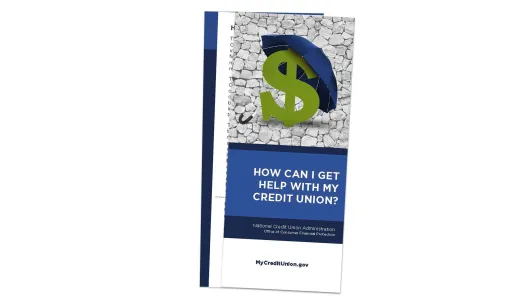How Can I Get Help With My Credit Union?

How Do I Resolve an Issue with a Credit Union?
- Contact the credit union. Address your concerns in writing to the credit union’s member service department, senior credit union management, or the credit union’s supervisory committee (if a federal credit union).
- Check the “Find an Answer” section at MyCreditUnion.gov. This section answers the most common questions asked by consumers.
- If your issue is still unresolved, submit a complaint in writing to the NCUA Consumer Assistance Center at MyCreditUnion.gov.
What Happens If I Submit a Complaint?
- File a Complaint: The complaint process begins when you submit a written complaint to the Consumer Assistance Center either online at MyCreditUnion.gov or by mail or fax.
- The NCUA Consumer Assistance Center: Upon receiving your complaint, the Consumer Assistance Center will determine whether your complaint involves matters for which the NCUA is the primary regulator, or refer your complaint to the appropriate federal or state regulator for handling.
- Forwarded to Credit Union for Attempted Resolution: If your complaint involves a federal consumer financial protection regulation for which the NCUA is the primary regulator, we will forward it and any documents to the credit union to review. The credit union may attempt to resolve your complaint directly with you within 60 calendar days of receiving your complaint. In the event that the matter is resolved and the credit union confirms this in writing to both you and the NCUA Consumer Assistance Center within the 60-day time period, the NCUA Consumer Assistance Center will close your case.
- The NCUA Consumer Assistance Center Investigation: If the matter remains unresolved, the NCUA Consumer Assistance Center may begin a formal investigation of the matter. For more information on the complaint process, visit MyCreditUnion.gov.
How Do I Submit a Complaint to the NCUA?
Follow the instructions at MyCreditUnion.gov or on the printed Consumer Assistance Form. Also, be sure to:
- List events in the order they occurred. Include full names, dates and a description of the problem with the amount(s) and date(s) of any transaction(s).
- Be as concise and complete as possible in describing your complaint.
- Provide copies of correspondence between you and the credit union and any other documents that will help us review your complaint.
Do not send original documents. Do not include any personal or sensitive information, such as your social security, credit card or account numbers.
NOTE: The information collected is solicited to provide the NCUA with data that is necessary and useful in reviewing requests received from individuals regarding their interactions with federally insured credit unions. You are not required to give us this information. However, without such information, our ability to complete a review or to provide requested assistance may be hindered. It is intended that the information you provide to us will be used within the NCUA and provided to the credit union that is the subject of your complaint or inquiry. As required by law, we may make additional disclosures of such information.
How Can The NCUA Help?
The NCUA’s Consumer Assistance Center provides consumers with information about federal consumer financial protection and share insurance matters, and assists consumers in resolving disputes with credit unions.
The NCUA’s Consumer Assistance Center is responsible for addressing consumer complaints involving federal credit unions with total assets up to $10 billion, and in certain instances, federally insured state-chartered credit unions with total assets up to $10 billion.
The NCUA does not have the authority to resolve every type of problem that may arise with a credit union. We are unable to resolve contract disputes or undocumented factual disputes between a consumer and a credit union. In these cases, we suggest you contact an attorney. We cannot investigate a matter that either has been addressed or is pending a decision by a court of law. The NCUA cannot offer legal assistance. Federal consumer financial protection laws apply to credit unions. These laws included the Equal Credit Opportunity Act, which requires credit be made available to members without regard to sex, marital status, race, national origin, age, or any other prohibited basis.
Where Can I Find Out More Information?
If you have questions about the NCUA’s consumer complaint process visit MyCreditUnion.gov, or call the NCUA’s Consumer Assistance Center at: 800-755-1030. The online NCUA Consumer Assistance Center includes frequently asked questions on issues such as fraud, deposit accounts, mortgages, and consumer loans. MyCreditUnion.gov is also a useful resource for learning about personal finance and protecting your money.